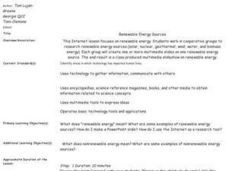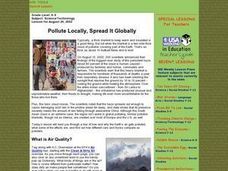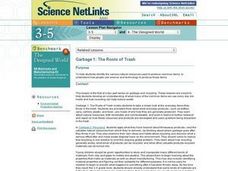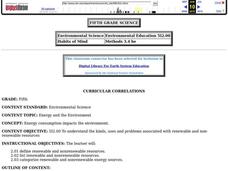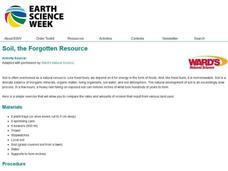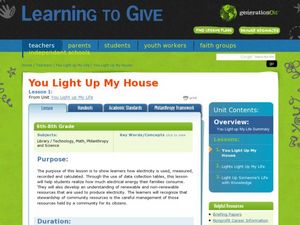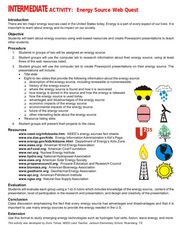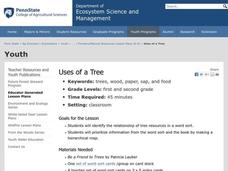Curated OER
Project Yellow Bus
Students discover the uses of energy and the difference between renewable and nonrenewable resources. They participate in hands-on activities to help them explain the concept of energy.
Curated OER
Environment: Renewable Energy Sources
Pupils, in groups, conduct Internet research on various renewable energy sources. The groups create several multimedia slides for inclusion in a class presentation. Topics covered include solar, nuclear, and geothermal power.
Curated OER
Natural Resources
In this natural resources worksheet, students will brainstorm 3 examples of renewable resources and 3 examples of nonrenewable resources. This worksheet is a graphic organizer.
Curated OER
POWER UP!
Students compare and contrast different energy sources and the trade-offs of using them.
Curated OER
Pollute Locally, Spread It Globally
Students examine the rate of pollution throughout the world through an interactive program. They define air quality and the air quality index. They examine fuel economy and its impact on the Earth and renewable and nonrenewable resources.
Curated OER
GARBAGE 1: THE ROOTS OF TRASH
Students identify the various natural resources used to produce common items; to explain how people use science and technology to produce those items.
Curated OER
Energy and the Environment
Fifth graders define terms associated with renewable and nonrenewable resources. They identify materials that are renewable and nonrewable. They categorize a list into the correct type of resource.
Curated OER
Management of Commercial Fisheries
Students examine the differences between renewable and nonrenewable resources and study about past fisheries. In this fishery lesson students explore the complexity of a fishery and its management.
Curated OER
Soil, the Forgotten Resource
Students discuss soil understanding that is is often overlooked as a natural resource. In this science lesson, students recognize that we depend on it for energy in the form of foods. Students experiment with six boxes of soil to help in...
Curated OER
You Light Up My House
Middle schoolers explore renewable and nonrenewable resources. In this electricity lesson, students consider way to reduce the energy that they use as they chart and analyze their own electricity usage.
National Wildlife Federation
Green Green Revolution
School budgets don't have a lot of extra money, so when students propose saving the district money, everyone jumps on board. The first lesson in the series of 21 introduces the concept of an energy audit. Scholars form an eco-action team...
Thoughtful Education Press
Compare and Contrast
Encourage readers to compare and contrast the information that they find in informational text with a variety of reading passages and worksheets. Learners read all about subjects in science, social studies, and literature...
Pennsylvania Department of Education
Pennsylvania’s Energy Supply
Third graders become familiar with the various types of energy and which types are found in Pennsylvania. In this Pennsylvanian energy resources lesson, 3rd graders, identify wind and water as sources of energy. Students...
Curated OER
Water Is Cool!
Students study water as a non-renewable resource. In this water lesson, students examine sources of water, uses of water, and explain why it is important to take care of water sources for the common good. They research the water cycle...
Curated OER
Steps for Taking a Cutting for Your Own Forest at Home
Young scholars study renewable and nonrenewable resources and take a hardwood cutting. In this hands on activity students learn what rooting hormones are, how they generate roots and then take their own cutting and root...
Curated OER
Global Resources: What Will You Do with Your Power?
Students examine the human impact on natural resources. They read and discuss an article, evaluate nations regarding their environmental problem-solving, develop a presidential speech on the environment, and conduct a natural resources...
Curated OER
Renewable Energy in Connecticut - Softening Our Footprint through Sustainable Energy Use
Students explore energy conservation. For this environmental lesson plan, students will look at data showing the amounts of energy used, our carbon footprint, and will research a power source. This unit allows for a deeper understanding...
Curated OER
Why Are Fossil Fuels Limited?
In this fossil fuels worksheet, students will determine why fossil fuels are a limited resource and brainstorm possible solutions. This worksheet is a graphic organizer.
Curated OER
It Won't Last Forever
Learners investigate the recycling process. In this recycling instructional activity, students set up a classroom program for recycling and set up recycling bins in various areas of the school. Learners investigate other options to...
Curated OER
Energy Conservation Lesson 1: Fossil Fuels and the Ticking Clock
Students explore energy production by participating in a class discussion. In this renewable energy activity, students discuss the differences between solar, coal, wind and fossil fuel energy sources and why some are better for the...
Curated OER
Energy Source Web Quest
Students research an energy source and create a Power Point presentation to share with the class. In this energy sources lesson, students are assigned an energy source to research. They use the Internet to research the source and create...
Curated OER
Forest Stewardship
Students define the term forest stewardship and they identify good forest stewardship practices. They are asked:"Does anyone enjoy spending time in the woods?" Students identify techniques of practicing good forest stewardship (taking...
Curated OER
Going in Cycles: The Life of an Aluminum Can
Students explore the life cycle of aluminum cans. In this recycling lesson, students review the manufacturing process and how to make a closed loop cycle. Students also have the opportunity to present what they've learned to others...
Curated OER
Uses of a Tree
Students identify and explore the resources we use that come from trees. In this reading comprehension lesson, students sort word cards about resources that come from trees into groups based on the type of resource.

